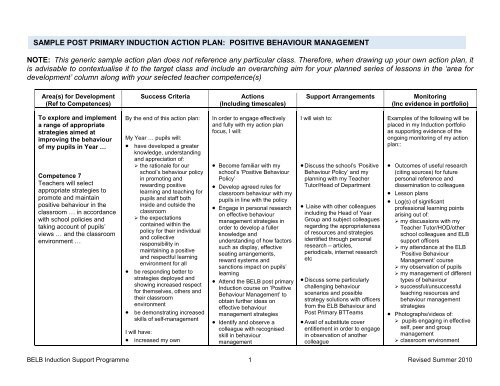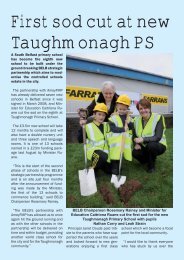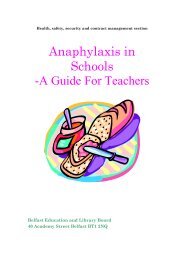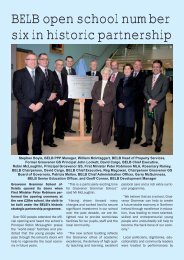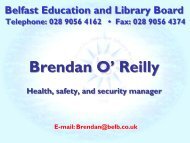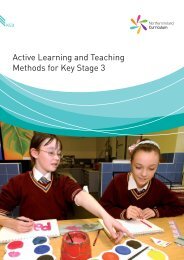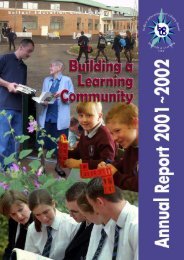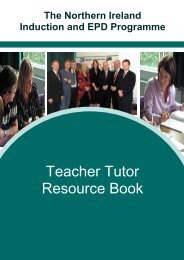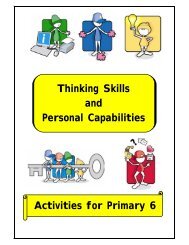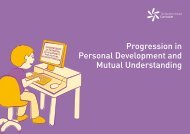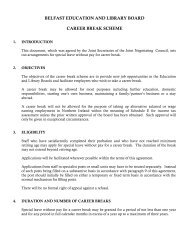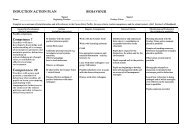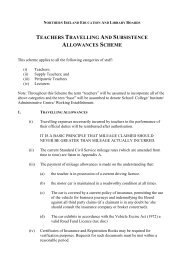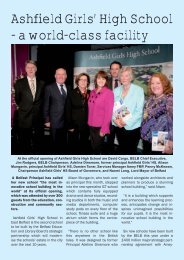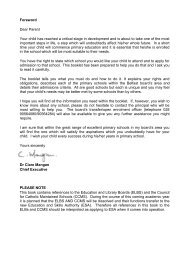sample post primary induction action plan: positive behaviour
sample post primary induction action plan: positive behaviour
sample post primary induction action plan: positive behaviour
You also want an ePaper? Increase the reach of your titles
YUMPU automatically turns print PDFs into web optimized ePapers that Google loves.
SAMPLE POST PRIMARY INDUCTION ACTION PLAN: POSITIVE BEHAVIOUR MANAGEMENT<br />
NOTE: This generic <strong>sample</strong> <strong>action</strong> <strong>plan</strong> does not reference any particular class. Therefore, when drawing up your own <strong>action</strong> <strong>plan</strong>, it<br />
is advisable to contextualise it to the target class and include an overarching aim for your <strong>plan</strong>ned series of lessons in the ‘area for<br />
development’ column along with your selected teacher competence(s)<br />
Area(s) for Development<br />
(Ref to Competences)<br />
Success Criteria<br />
Actions<br />
(Including timescales)<br />
Support Arrangements<br />
Monitoring<br />
(Inc evidence in portfolio)<br />
To explore and implement<br />
a range of appropriate<br />
strategies aimed at<br />
improving the <strong>behaviour</strong><br />
of my pupils in Year …<br />
Competence 7<br />
Teachers will select<br />
appropriate strategies to<br />
promote and maintain<br />
<strong>positive</strong> <strong>behaviour</strong> in the<br />
classroom … in accordance<br />
with school policies and<br />
taking account of pupils’<br />
views … and the classroom<br />
environment …<br />
By the end of this <strong>action</strong> <strong>plan</strong>:<br />
My Year … pupils will:<br />
• have developed a greater<br />
knowledge, understanding<br />
and appreciation of:<br />
‣ the rationale for our<br />
school’s <strong>behaviour</strong> policy<br />
in promoting and<br />
rewarding <strong>positive</strong><br />
learning and teaching for<br />
pupils and staff both<br />
inside and outside the<br />
classroom<br />
‣ the expectations<br />
contained within the<br />
policy for their individual<br />
and collective<br />
responsibility in<br />
maintaining a <strong>positive</strong><br />
and respectful learning<br />
environment for all<br />
• be responding better to<br />
strategies deployed and<br />
showing increased respect<br />
for themselves, others and<br />
their classroom<br />
environment<br />
• be demonstrating increased<br />
skills of self-management<br />
I will have:<br />
• increased my own<br />
In order to engage effectively<br />
and fully with my <strong>action</strong> <strong>plan</strong><br />
focus, I will:<br />
• Become familiar with my<br />
school’s ‘Positive Behaviour<br />
Policy’<br />
• Develop agreed rules for<br />
classroom <strong>behaviour</strong> with my<br />
pupils in line with the policy<br />
• Engage in personal research<br />
on effective <strong>behaviour</strong><br />
management strategies in<br />
order to develop a fuller<br />
knowledge and<br />
understanding of how factors<br />
such as display, effective<br />
seating arrangements,<br />
reward systems and<br />
sanctions impact on pupils’<br />
learning<br />
• Attend the BELB <strong>post</strong> <strong>primary</strong><br />
Induction course on ‘Positive<br />
Behaviour Management’ to<br />
obtain further ideas on<br />
effective <strong>behaviour</strong><br />
management strategies<br />
• Identify and observe a<br />
colleague with recognised<br />
skill in <strong>behaviour</strong><br />
management<br />
I will wish to:<br />
• Discuss the school’s ‘Positive<br />
Behaviour Policy’ and my<br />
<strong>plan</strong>ning with my Teacher<br />
Tutor/Head of Department<br />
• Liaise with other colleagues<br />
including the Head of Year<br />
Group and subject colleagues<br />
regarding the appropriateness<br />
of resources and strategies<br />
identified through personal<br />
research – articles,<br />
periodicals, internet research<br />
etc<br />
• Discuss some particularly<br />
challenging <strong>behaviour</strong><br />
scenarios and possible<br />
strategy solutions with officers<br />
from the ELB Behaviour and<br />
Post Primary BTTeams<br />
• Avail of substitute cover<br />
entitlement in order to engage<br />
in observation of another<br />
colleague<br />
Examples of the following will be<br />
placed in my Induction portfolio<br />
as supporting evidence of the<br />
ongoing monitoring of my <strong>action</strong><br />
<strong>plan</strong>::<br />
• Outcomes of useful research<br />
(citing sources) for future<br />
personal reference and<br />
dissemination to colleagues<br />
• Lesson <strong>plan</strong>s<br />
• Log(s) of significant<br />
professional learning points<br />
arising out of:<br />
‣ my discussions with my<br />
Teacher Tutor/HOD/other<br />
school colleagues and ELB<br />
support officers<br />
‣ my attendance at the ELB<br />
‘Positive Behaviour<br />
Management’ course<br />
‣ my observation of pupils<br />
‣ my management of different<br />
types of <strong>behaviour</strong><br />
‣ successful/unsuccessful<br />
teaching resources and<br />
<strong>behaviour</strong> management<br />
strategies<br />
• Photographs/videos of:<br />
‣ pupils engaging in effective<br />
self, peer and group<br />
management<br />
‣ classroom environment<br />
BELB Induction Support Programme 1<br />
Revised Summer 2010
Evaluation<br />
professional understanding<br />
and appreciation of<br />
important determinants in<br />
<strong>positive</strong> <strong>behaviour</strong><br />
management including the<br />
consideration of the<br />
classroom environment and<br />
the views of my pupils<br />
• expanded my repertoire of<br />
strategies to deal with<br />
different types of<br />
<strong>behaviour</strong>al situations and<br />
be using these strategies<br />
with greater confidence and<br />
effectiveness<br />
• Be observed by my Teacher<br />
Tutor/HOD/Principal<br />
situations, including wall<br />
displays, that encourage<br />
<strong>positive</strong> <strong>behaviour</strong>.<br />
• Pupil feedback – (consider<br />
questionnaires, videos,<br />
podcasts)<br />
• Completed Teacher<br />
Tutor/HOD observation<br />
feedback reports<br />
• Induction Interim and<br />
Summative Reports<br />
Evaluation is about using the evidence and information you have gathered from the monitoring process to make judgements about your area for<br />
development and to ascertain the extent to which your success criteria has been achieved.<br />
It looks at what you set out to do, what you have accomplished, and how you accomplished It.<br />
You can use the information to inform what you would do differently and what changes/improvements you would make in your teaching.<br />
Self Reflection<br />
Having completed the evaluation of your <strong>action</strong> <strong>plan</strong> you should now take some time to reflect on the process that you have gone through. You may wish to<br />
give some consideration to the following:<br />
o What have you learned about yourself and your own professional development<br />
o What particular skills did you exhibit/develop<br />
o To what extent do you feel you furthered your knowledge and understanding of your chosen area for development<br />
o Have you identified any other professional needs that you feel you need to develop as a result of this <strong>action</strong> <strong>plan</strong> process<br />
o What do you now need to do to take your professional development needs forward<br />
Your self-reflection can now be used as part of the basis for discussion with your teacher tutor when completing the interim and summative reports.<br />
Continue on additional sheets or complete in a separate word document at the end of the whole <strong>action</strong> <strong>plan</strong>ning process, i.e. after the lessons<br />
have been taught and observations have been carried out.<br />
Name: Signed: Signed:<br />
Beginning Teacher<br />
Teacher Tutor<br />
BELB Induction Support Programme 2<br />
Revised Summer 2010


